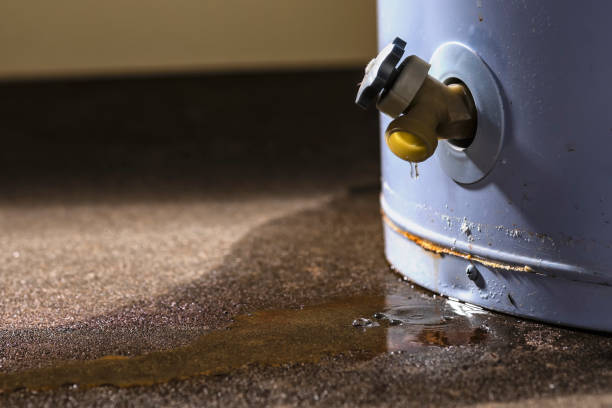Essential Guidance for Residential Property Owners Dealing with Broken Heating Units
Essential Guidance for Residential Property Owners Dealing with Broken Heating Units
Blog Article
This article in the next paragraphs relating to Broken Water Heaters is quite enlightening. Give it a go and make your own personal findings.

Whether it lies in the basement or a separate room, busted water heaters can cause stress and anxiety. A conventional system holds 80 gallons, so an over night leakage will lead to a flooding. This results in major home damage with soaked walls and floors. Besides, having no warm water supply is additionally troublesome. If you are taking care of these issues, take note of the following:
Call the Plumber
After doing the initial two safety actions, you should call your plumber to come right away to deal with a fractured water heating unit. There are usually indications that your aging water heater has debris accumulation in the inside.
Rather, as soon as you spot these indications, have actually a professional come to check your water heating unit container. Normally, water heaters have a life expectancy of regarding 8 to 12 years.
Cut Off the Cold Water Supply
Cut off the storage tanks tap water supply from the resource. This goes from your main water line into the storage tank. When your storage tank remains in good condition, the cold water stops filling up when the container is full. Yet because it is dripping, the water will remain to move. Close the valve found at the top of the heating unit. Turn this clockwise to close it off. If you can not discover it or reach it, you have to shut off that major water supply line outside your property.
Shut Off Source Of Power
Before calling the plumber, shut off a gas hot water heater by turning the temperature dial. This is usually situated on top of the thermostat. Switch off the circuit breaker if you have a design that runs on electrical power. This will certainly avoid electrocution, specifically if there is a leak as water is a conductor. Generally, the burner shuts down when the water strikes a specific temperature level. With a busted storage tank, it may malfunction. Cutting it off guarantees you remain risk-free.
Tidy up Property
After calling the plumber, paper damage by making note as well as photos so you can claim your house owner's insurance coverage. From there, begin the immediate cleanup. Secure any kind of vital possessions to prevent further soaking. Then, eliminate any standing water to avoid mold and also mildew growth. If you have a submersible water pump, make use of that to drain the water. Or else, the conventional bucket method will certainly also work. Try to wipe out everything, including baseboards and also wall surfaces. If you have an electrical fan as well as dehumidifier, maintain them running to maintain air distributing. This will certainly assist prevent mold development.
Bear in mind, if you discover any type of problems with your water heater, call the pros as soon as possible. You can not take this issue lightly because a defective thermostat can raise water temp to an alarmingly high level, leading to unexpected burns. A broken heater pressure relief valve can additionally cause an explosion. For best outcomes, get an annual check so your device obtains checked, cleansed, drained pipes, and re-filled, ensuring ideal performance.
After doing the first 2 safety actions, you must call your plumber to come right away to repair a burst water heating system. Instead, as soon as you find these signs, have actually an expert come to evaluate your water heater tank. Prior to calling the plumber, shut off a gas water heating unit by turning the temperature dial. If you have a completely submersible water pump, utilize that to drain the water. Remember, if you observe any kind of issues with your water heating unit, call the pros right away.
Is My Water Heater Broken?
The Water Heater is Old
No appliance will last forever. This includes a home’s water heater. During its lifespan, residents are going to face a situation where a new water heater installation will be necessary. The biggest problem with this is that most people are not sure when their water heater expires. Not knowing this can lead to serious risks if the unit begins to act up due to old age.
Most makes and models of water heaters will last between eight and 10 years. While 10 years is the age when water heater replacement is highly recommended, the need to replace the unit may occur before this time or after. If the unit doesn’t show any symptoms of a problem, it is a good idea to replace it at the 10-year mark (from the manufacture date).
Some of the symptoms that indicate a new unit is needed include rusting, leaks, noises, and a failure to heat up the water. Also, note that not all units have a 10-year life expectancy. The main exception to this rule is that a gas unit will last for six to eight years.
Rusty Heater Inlet Valve or Water
While steel is the strongest material on earth, it does have a weakness – rust. If corrosion occurs on a steel surface, it will begin to spread and eat through the steel in certain areas. On water tanks and pipes that are made of steel, rust is a warning sign of an impending leak.
The issue for many is trying to figure out if the rust is coming from the water heater or the pipes that lead to the faucet. If rust is seen, it is a clear indication that water heater service from the professionals is needed.
If rusty water appears out of the faucets in the bathtub or sink, it likely means a rusty water heater. If there is rust near the water inlet or the pressure relief valve, rust has likely developed inside the tank. If tap water appears rusty, it may be an issue with the pipes.
Strange Sounds from the Water Heater
Are there strange sounds coming from the tank? As a water heater gets older, rumbling noises may develop and get louder and louder as the water in the tank heats up. In homes where large amounts of hot water are used, the issue is likely going to be even more obvious when more serious issues arise. If there is a strange or loud noise coming from the unit, it is probably because of sediment buildup. A good way to remedy this problem is by flushing the heater. If this does not work, then a new unit may need to be installed.
Leaks
As a water heater gets closer to the end of its useful life, there is a higher chance there will be water around the tank. If there is water, this usually means leaks are occurring. Based on where the unit is located in the home, a leak may result in serious property damage.
Leaks are usually caused by expansions in the metal tank. The expansions occur as time passes and as the inside body of the tank is exposed to multiple heating cycles per day. When a fracture forms, the gap will be slight enough to hold the water in; however, in more serious situations, this will not be the case. If the tank is idle, the water will not leak but when the metal expands during each heating system, small amounts of water will get through the gap.

Do you like reading up on Water Heater Burst? Try leaving feedback below. We would be pleased to listen to your responses about this post. Hoping that you come back again before long. Enjoyed our write-up? Please share it. Help others discover it. Thanks for your time. Don't hesitate to stop by our site back soon.
Need pros? Call! Report this page